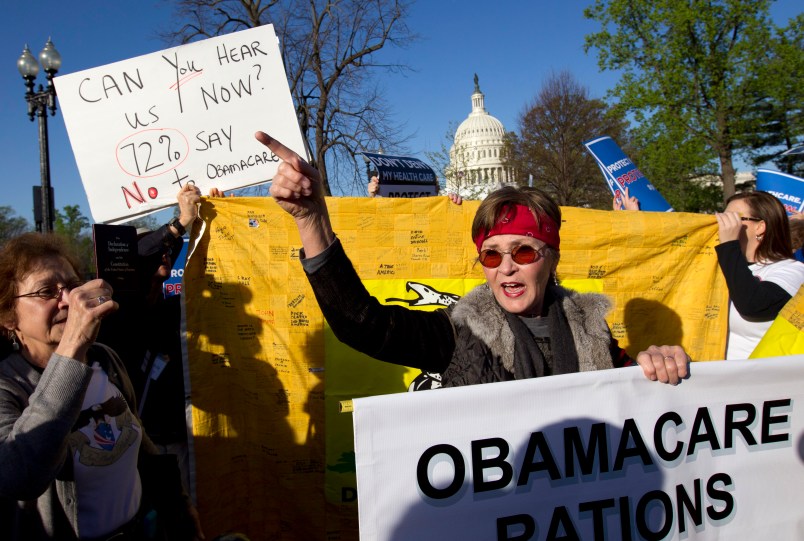Republicans and conservative wonks have long supported de-linking health insurance from employment in order to give workers more economic freedom. But now they’re attacking Obamacare for … doing just that.
Republicans seized on a Congressional Budget Office report Tuesday to attack Obamacare for “destroying” or “costing” jobs. The reality wasn’t so simple; in fact, CBO didn’t project any pink slips; it said some 2 million workers would voluntarily exit the full-time labor force (over a decade) because Obamacare will make them less dependent on their employer for health insurance. They can retire early, start a business, pursue a degree or spend more time with their families without the fear of losing health care coverage.
It has been an important conservative goal — before and after the Obamacare debate poisoned intra-GOP politics — to give workers more flexibility and freedom to retain health insurance if they switch jobs or quit. Indeed, existing health care alternatives by conservatives would have similar effects on workers.
“De-linking health insurance from employment has been a big theme in conservative proposals, and frankly liberal proposals too (e.g. single payer plans),” said Larry Levitt, senior vice president of the Kaiser Family Foundation.
In Oct. 2008, the conservative Heritage Foundation called this phenomenon “job lock” and “[a]n obstacle to labor mobility.” A Heritage research paper praised then-presidential candidate Sen. John McCain’s (R-AZ) health care plan for addressing the problem by proposing adjustments to the tax treatment of health care, among other reforms.
“Today, leaving a job or changing jobs means leaving behind the health insurance provided at the place of work,” wrote authors Robert E. Moffit and Nina Owcharenko. “Individuals who wish to take a better job, change careers, or leave the workforce to raise a family or to retire early take substantial risks.”
Due to a quirk in the federal tax code that came about after World War II, one out of two American workers gets health insurance from an employer. Conservatives have for years been lamenting that the difficulty of buying coverage outside the workplace hinders economic freedom by discouraging entrepreneurship and risk-taking due to the fear of health insecurity (as well as the rising cost of providing care).
A Sept. 2006 research paper by the conservative American Enterprise Institute argued the tax preference for employer-based insurance created a “lack of choice” that can “disadvantage employees.”
“Those who buy their health insurance through their employers may find themselves locked into their current employment for fear that they might lose coverage,” wrote author Joseph Antos. “If the worker or a family member develops a serious health condition, a job change could mean the total loss of insurance or exclusion of that condition from coverage.”
Obamacare seeks to fix this problem by providing financial assistance to get coverage and prohibits insurance companies from shutting out sick people. The Heritage Foundation and various prominent Republicans supported this approach during the 1990s and 2000s, but abandoned it once Democrats took it up. And so conservatives set about proposing new ways of disentangling health insurance and employment, such as unwinding the tax exclusion for job-based coverage, offering individuals a tax credit to buy insurance and expanding Health Savings Accounts.
The most recent of these proposals was put forward recently by Republican Sens. Orrin Hatch (UT), Tom Coburn (OK) and Richard Burr (NC). It provides subsidies for Americans to buy insurance regardless of their employment situation. “This protection ensures that individuals can transition from employer-based coverage to insurance in the individual market without being forced to face high premiums solely because of a costly underlying health condition,” according to a summary of the proposal released by Hatch’s office.
The goal is similar to that of Obamacare, and portends similar behavioral consequences. The CBO found that due to the Affordable Care Act, Americans will work an average of 1.5 to 2 percent fewer hours between 2017 and 2024. If Republicans give workers better health care options outside the workplace, it’ll motivate some of them to exit the full-time labor force.
“If you cap or reduce the tax exemption for employer-provided insurance – as some conservative proposals call for – you could have bigger labor market effects because you’re reducing the incentive to work,” said Levitt. “How a proposal changes the individual insurance market can have an effect too. The better and more secure individual market coverage, the less people may feel ‘job locked.'”






